Whether you're planning a quick one-day tour or an immersive multi-day journey, understanding the city's rhythms—from the predawn bathing rituals at Assi Ghat to the mesmerizing evening ceremonies at Dashashwamedh Ghat—will transform your visit into an unforgettable spiritual adventure.

Essential Varanasi Travel Information
When to Visit Varanasi: Best Time for Sightseeing
Best Time to Visit Varanasi
The optimal period for visiting this Banaras tourist spot is October through March, when temperatures range from a comfortable 5°C to 25°C. Winter months offer pleasant weather ideal for exploring the ghats, taking boat rides, and attending outdoor ceremonies without the oppressive heat.
Month-by-Month Breakdown:
- November-December: Temperatures drop to comfortable levels with nighttime lows in the 10-15°C range and daytime highs around 20-25°C. The monsoon has ended, and the ghats are fully accessible.
- January-February: The coolest months with crisp mornings perfect for sunrise boat rides. Early morning temperatures can dip to 5°C, so pack warm layers.
- March: Temperatures begin rising (reaching 30°C by month's end) but remain manageable. This is still considered peak season before the summer heat arrives.
Seasons to Avoid:
- April-June (Summer): Scorching heat with temperatures soaring between 30-45°C makes outdoor sightseeing extremely challenging.
- July-August (Peak Monsoon): Heavy rainfall can cause the Ganges to swell dramatically, submerging many ghats and making them inaccessible or slippery.
For detailed month-by-month planning, see our Best Time to Visit Varanasi guide. Specific seasonal insights: Varanasi in October, Varanasi in November, Varanasi in December, Varanasi in January, Varanasi in February, and Varanasi in Monsoon.
How to Reach Varanasi: Getting to the City
By Air

Lal Bahadur Shastri International Airport (VNS) is located approximately 25 km northwest of Varanasi city center in Babatpur. The airport connects to major Indian cities including Delhi, Mumbai, and Kolkata, with some international flights.
Transfer Options:
- Prepaid Airport Taxi: ₹900-1,400 for sedans; ₹1,250-2,500 for SUVs (40-60 minutes journey time)
- App-based Rides: Uber and Ola available
- Tempo Traveller (for groups): ₹2,500 for airport pickup
Complete airport transfer guides: Varanasi Airport Taxi Guide, Airport Taxi Price Guide, and Airport Tempo Traveller for group transfers. For distance calculations: Assi Ghat to Airport Distance.
By Train

Varanasi Junction (also called Varanasi Cantt) is the main railway station, well-connected to all major Indian cities. The station is approximately 5-7 km from the main ghat area.
By Road

Regular buses and private vehicles connect Varanasi to nearby cities. The NH19 highway links Varanasi to Allahabad (122 km) and other destinations.
Varanasi Safety Tips for Tourists
Varanasi is generally safe for tourists, but awareness of local conditions enhances your experience.
Traffic Management: During major festivals and VVIP visits, authorities implement traffic diversions. Buses and large vehicles may be restricted from entering the old city area.
Crowded Areas: The narrow lanes (galis) leading to the ghats can be extremely congested. The Kashi Vishwanath Temple corridor is a designated 'no vehicle zone' due to increasing crowds.
Women Travelers: Dress conservatively with covered shoulders and legs. Avoid going out alone late at night in isolated areas.
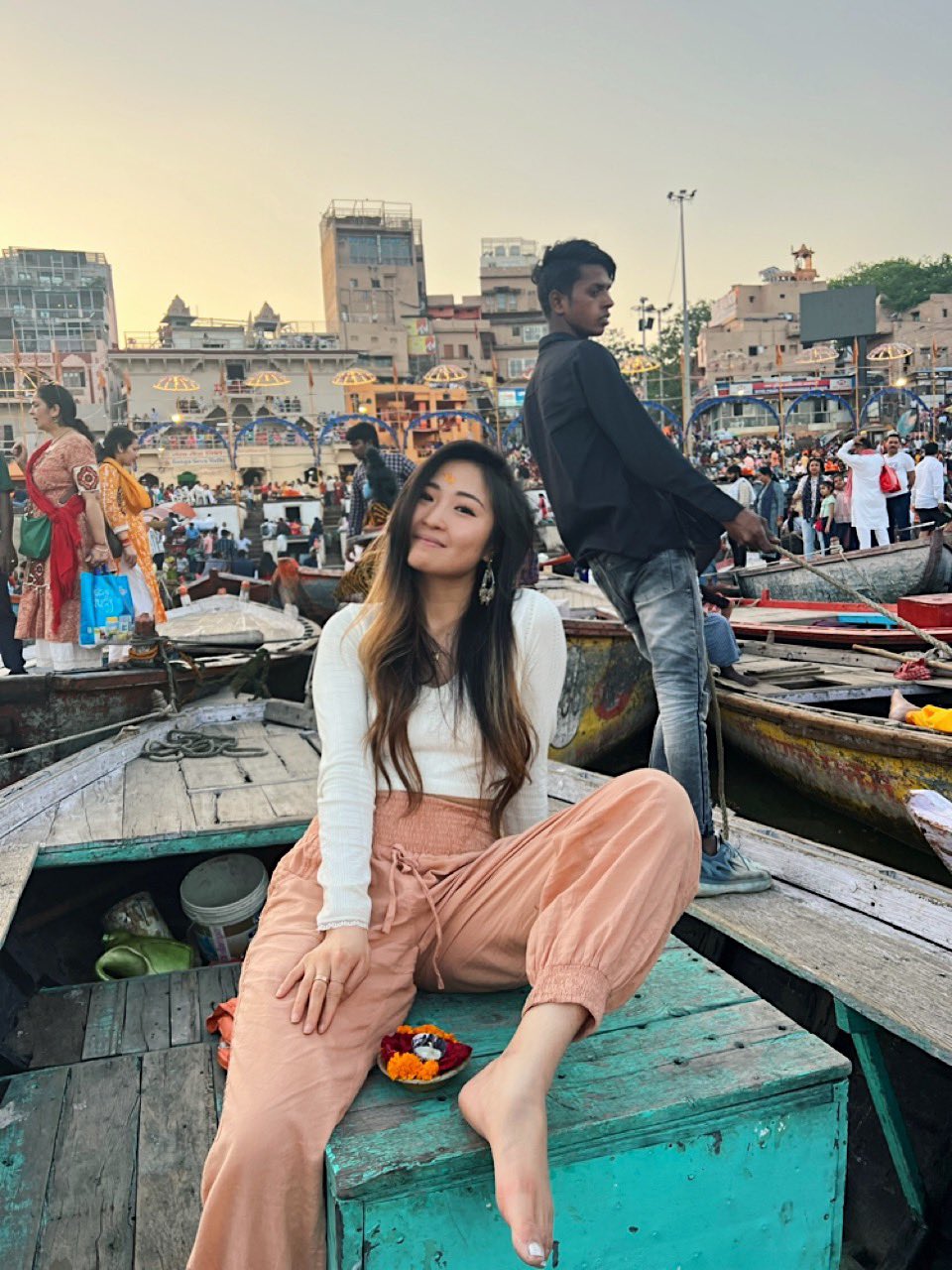

Monkeys: Be cautious of monkeys on rooftops near temples and ghats. Many hotels install wire mesh as protection. Don't carry visible food.
Detailed safety guides: Is Varanasi Safe for Solo Female Travellers, Safety and Security in Varanasi, Safest Taxi for Women, and What to Wear in Varanasi.
Varanasi Ghats Guide: The Soul of the City
Varanasi's 84 ghats form the beating heart of the city, stretching along the western bank of the Ganges for approximately 7 kilometers. These stone steps serve as theaters for life, death, devotion, and daily rituals that have remained unchanged for millennia.

Dashashwamedh Ghat: Main Ganga Aarti Location
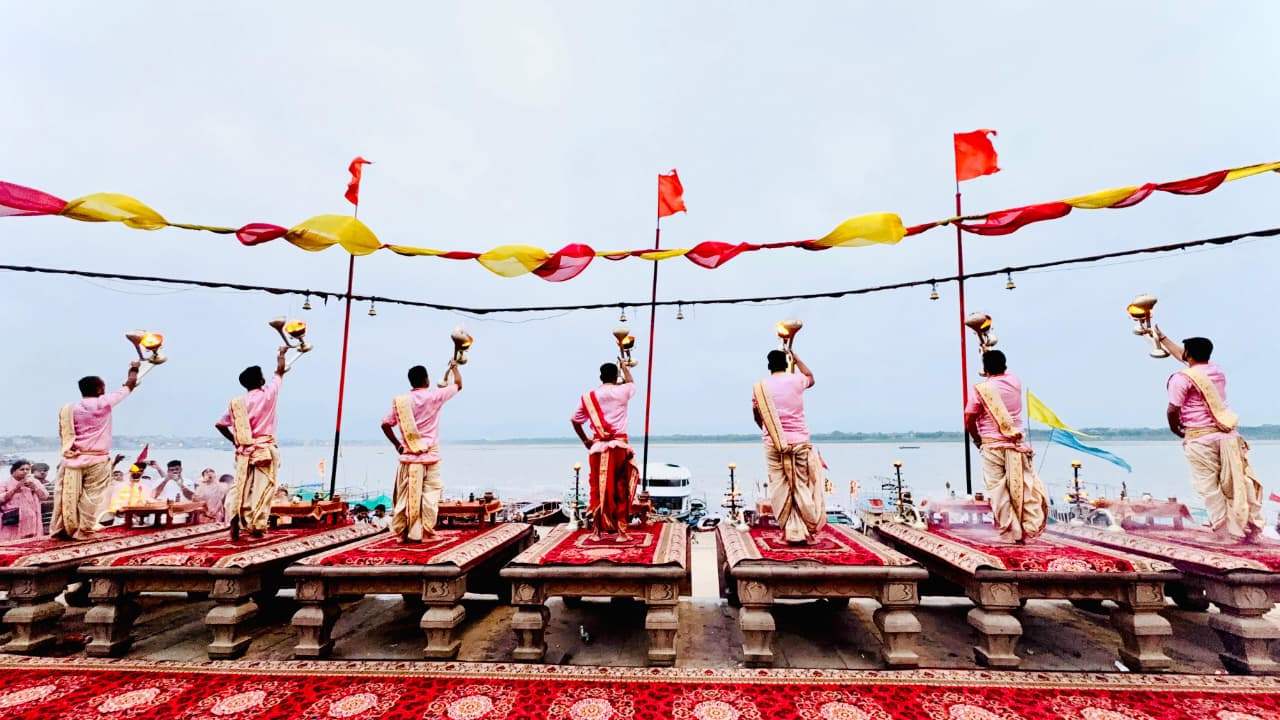
Spiritual Significance
Dashashwamedh Ghat ranks among the five most sacred ghats on the Ganges. According to the Ramayana, Lord Brahma performed the Ashwamedha Yagna (ten horse sacrifices) here, giving the ghat its name. This is the epicenter of Varanasi's spiritual tourism and the most famous Banaras tourist spot.
The Grand Evening Aarti
Every evening, seven or more priests dressed in ceremonial robes perform a synchronized 45-minute fire offering using multi-tiered brass lamps, conch shells, and sacred mantras. Thousands gather on the steps and in boats to witness this powerful spectacle, with chants of "Har Har Mahadev" and "Jai Maa Gange" echoing across the river.
Visiting Tips:
- Location: Central Varanasi, easily accessible from most hotels
- Best Time: Arrive 60-90 minutes before the evening aarti for good seating
- Entry: Free access to ghat steps
- VIP Seating: ₹150-500 (book in advance)
- Boat Viewing: ₹100-300 per person for a floating perspective
- Accessibility: Wheelchair-friendly pathways available; special viewing areas reserved for wheelchair users during aarti
Coordinates: 25.3094°N, 83.0133°E
Detailed aarti guide: Dashashwamedh Ghat Ganga Aarti Timing
Assi Ghat: Best Sunrise Ghat in Varanasi

Located at the southern end where the Assi River meets the Ganges, Assi Ghat offers a more tranquil alternative to the crowds of Dashashwamedh. This spacious ghat is a pilgrimage spot where devotees bathe before worshipping the Shiva Lingam under a pipal tree.
Subah-e-Banaras (Morning Aarti)
The dawn aarti at Assi Ghat, known as Subah-e-Banaras, welcomes the rising sun with devotional songs and offerings to Mother Ganga. Timings vary by season:
- Summer (April-June): 5:00 AM
- Monsoon/Winter (July-March): 5:30 AM
Evening Activities
A Ganga Aarti is also held at Assi Ghat, typically starting around 6:00-6:30 PM in winter and 6:30-7:00 PM in summer, lasting approximately 45 minutes.
What Makes Assi Special:
- Less crowded than Dashashwamedh, ideal for quiet contemplation
- Popular with backpackers; nearby cafes like Vaatika Cafe
- Starting point for many sunrise boat rides
- Free yoga sessions often held on the ghat
Accessibility: More spacious than other ghats but still has steps without handrails
Complete timings guide: Assi Ghat Aarti Timings 2025 and Assi Ghat Timings for detailed daily schedules.
Manikarnika Ghat: Sacred Cremation Ghat (Photography Rules)
Manikarnika Ghat is Varanasi's most sacred cremation ghat, where Hindus believe cremation guarantees moksha (liberation from the cycle of rebirth). According to mythology, Sati's earring fell here, making it eternally sacred.
Understanding the Cremation Rituals
Approximately 300 bodies are cremated daily at this ghat, operating 24/7. Families perform final rites following ancient Vedic traditions. The eternal flame (Manikarnika Agni) has reportedly burned continuously for thousands of years.
Strict Rules for Visitors:
Photography & Videography: Absolutely prohibited. Taking photos of cremation ceremonies is deeply offensive and disrespectful to grieving families. You may be confronted or asked to delete footage. Photography of the general ghat area (away from active cremations) may be acceptable.
Dress Code & Behavior:
- Wear modest, conservative clothing (covered shoulders and legs)
- Maintain complete silence; no loud conversations, phone calls, or laughter
- Do not eat, smoke, or chew gum near the cremation grounds
- Refrain from displaying emotional reactions like shock or excessive curiosity
- Keep a respectful distance from ceremonies
Donation Etiquette: You may be approached for donations to support wood for the poor. These are often genuine but not mandatory. If you wish to contribute, ₹100-500 is reasonable. Decline politely if pressured.
Best Time to Visit: 8:00 AM to 7:00 PM if you want to observe cremations, though the ghat operates around the clock.
Viewing from Boats: Many visitors choose to view Manikarnika from a respectful distance during their Ganges boat ride, which provides context without intruding.
Comprehensive ghat guides: Guide to 10 Most Important Ghats of Varanasi, Guide to Ghats of Varanasi, and Manikarnika Ghat Sacred Cremation Grounds for in-depth understanding.
Other Important Varanasi Ghats to Visit
Harishchandra Ghat: Another prominent cremation ghat, named after the legendary King Harishchandra who worked here. It's believed to be equally powerful as Manikarnika for attaining moksha.
Scindia Ghat: Named after the Maratha Scindia family, this ghat features an elegant Shiva temple that partially submerged into the river, creating a striking visual. It's a departure point for boat rides and offers a serene environment for meditation.
Panchganga Ghat: Believed to be the confluence of five rivers (though only the Ganges is visible). This historic ghat has significant religious importance.
Man Mandir Ghat: Features intricate architecture with ornate balconies. The observatory built by Raja Man Singh of Jaipur stands here.
Chet Singh Ghat: A fortified ghat with a palace, historically significant for its role in 18th-century conflicts.
Ganga Aarti Varanasi: Timings, Viewing & Booking Guide
The Ganga Aarti is the crown jewel of any Varanasi sightseeing experience, offering visitors a deeply moving encounter with living Hindu spirituality.

Ganga Aarti Timings in Varanasi (2025 Updated)
Evening Aarti at Dashashwamedh Ghat
The evening aarti is Varanasi's grandest ritual, performed daily at Dashashwamedh Ghat.
Timings (Updated 2025):
- Summer & Monsoon (April-September): 6:45-7:00 PM
- Winter (October-March): 5:45-6:00 PM
- Duration: Approximately 45 minutes
What to Expect: Seven or more priests in saffron and gold attire stand on raised platforms, performing synchronized movements with multi-tiered brass lamps containing multiple flames. The ceremony includes conch shell blasts, rhythmic bell ringing, incense offerings, and devotional chants accompanied by live music. The reflection of fire lamps on the river creates a surreal, golden atmosphere.
For complete 2025 timing details, season variations, and best viewing spots, see our comprehensive Ganga Aarti Timing Varanasi 2025 guide.
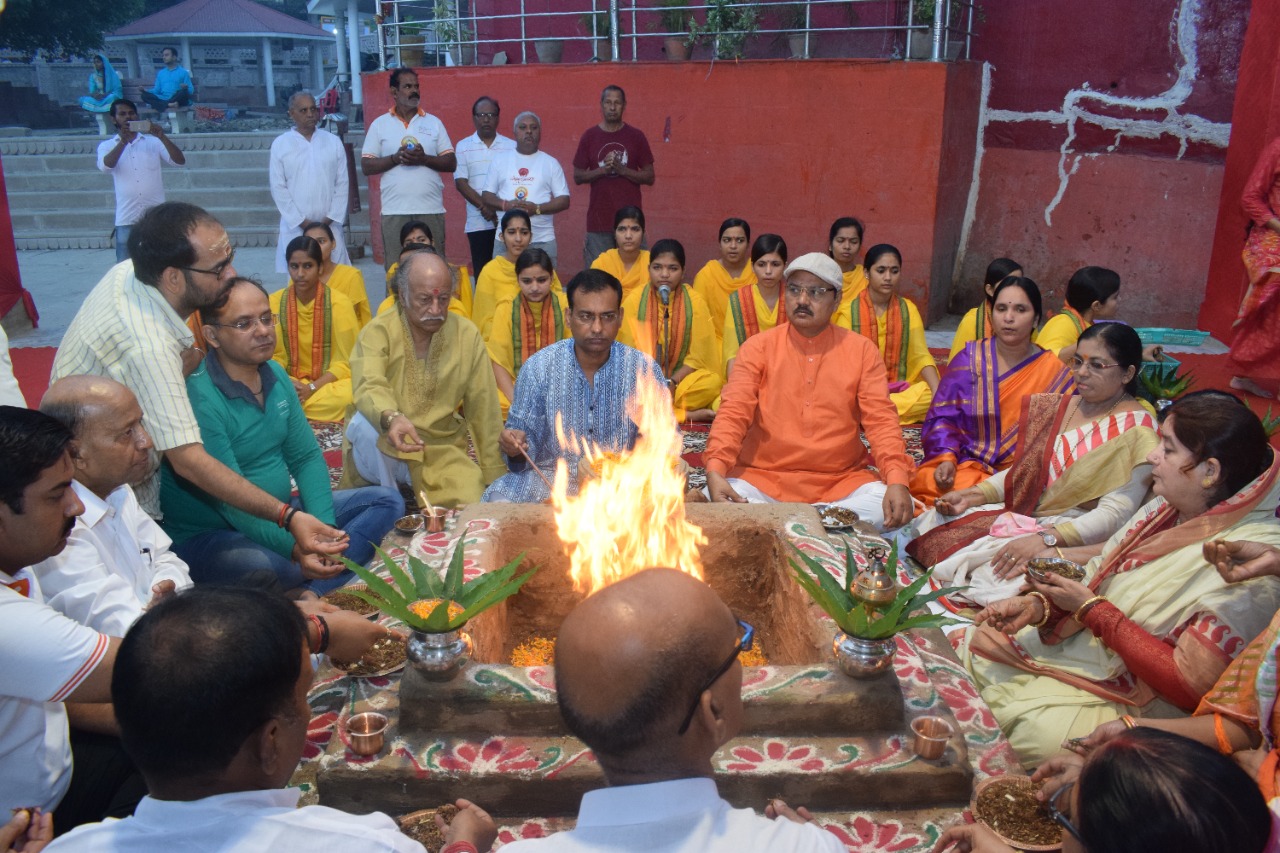
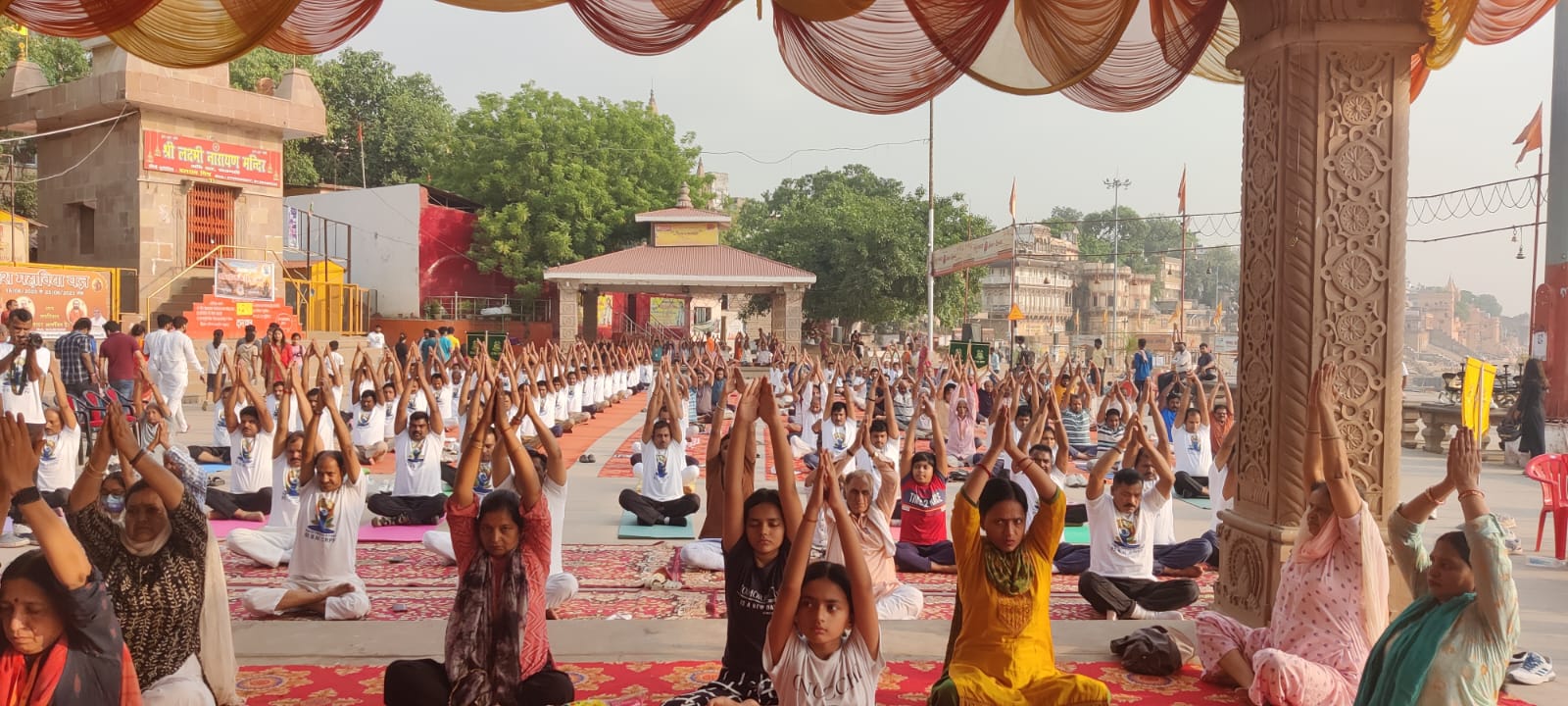
Morning Aarti at Assi Ghat
A more intimate ceremony welcoming the sunrise:
- Summer: 5:00 AM
- Monsoon/Winter: 5:30 AM
Viewing Options & Booking
From the Ghat Steps (Free):
- Arrive 60-90 minutes early for good spots
- Extremely crowded, especially during peak season
- Bring a small mat or cloth to sit on
VIP Seating (₹150-500):
- Reserved front-row seats with clear views
- Must be booked in advance through hotel concierges or official tour operators
- Worth the investment during busy periods
From a Boat (₹100-300 per person for shared; ₹1,200-2,000 for private):
- Offers a unique floating perspective
- Less crowded and more atmospheric
- Book through reputable operators like Varanasiguru.com or your hotel
Complete Dashashwamedh guide: Dashashwamedh Ghat Boat Ride & Ganga Aarti Guide covers boat pricing, VIP seating, photography tips, and seasonal schedules.
Special Festival Dates
Dev Deepawali (November 12, 2025 / Kartik Purnima): The "Diwali of the Gods" when over a million earthen lamps illuminate all 84 ghats. Evening aarti begins around 5:30 PM and continues late. Expect triple crowd density and advance booking is essential.
Festival resources: Dev Deepawali 2025 Ultimate Guide, Dev Deepawali Best Viewing Spots, Dev Deepawali Boat Ride Pricing Guide, Dev Deepawali Crowd Survival Guide, Dev Deepawali Photography Guide, Dev Deepawali Taxi Booking, and Ganga Mahotsav 2025.
Practical Tips
- Photography: Allowed from boats and ghat steps, but be respectful
- Dress Code: Modest clothing appropriate for religious ceremonies
- Peak Times: Weekends and Indian holidays see significantly larger crowds
- Elderly/Accessibility: Wheelchair users can access special viewing areas at Dashashwamedh Ghat
Boat Rides on the Ganges: Price & Booking Guide
A boat ride on the sacred Ganges is essential for any Varanasi sightseeing itinerary, offering perspectives of the ghats impossible to experience from land.


Sunrise Boat Ride Varanasi: Best Time & Experience
Timing & Experience
The golden hour between 5:00-7:00 AM transforms Varanasi into an ethereal dreamscape. As the sun rises, you'll witness:
- The city awakening with morning prayers and bathing rituals
- Priests performing fire offerings (puja) on the ghats
- Yoga practitioners and devotees taking holy dips
- The interplay of light on ancient architecture and water
Typical Route: Most sunrise rides start from Assi Ghat and proceed north toward Dashashwamedh Ghat, passing Manikarnika Ghat (viewing cremations from a respectful distance), and covering major ghats over 60-90 minutes.
Evening Boat Ride Varanasi with Ganga Aarti

Best Time: 5:30-7:30 PM (depending on season) to witness the illuminated ghats and Ganga Aarti from the water.
Evening rides offer:
- A floating view of the synchronized Ganga Aarti ceremony
- The magical sight of thousands of diyas (oil lamps) floating on the river
- Ambient chants and temple bells echoing across the water
Varanasi Boat Ride Price (Updated 2025)
Boat Types & Pricing (Updated 2025):
Shared Row Boats:
- ₹100-250 per person for sunrise ride
- ₹200-300 per person for evening/Aarti ride
- Duration: 60-90 minutes
Private Row Boats:
- ₹800-1,500 for sunrise (accommodates 4-6 people)
- ₹1,200-2,000 for evening Aarti ride
- More personalized experience; boatman adjusts pace to your preferences
Motorized Boats:
- ₹2,500-5,000 for 2-hour private cruise
- Faster travel; can cover all 84 ghats in one journey
- Often include seating, guide services, and refreshments
For complete 84-ghat coverage, see our 84 Ghats Boat Tour Varanasi guide with detailed route maps, top ghats to see, and pricing by boat type.
Luxury Double-Decker Cruises:
- ₹15,000 for 4-hour booking (Dev Deepawali and festivals)
- Cushioned seating, guides, refreshments included
Special Packages:
- Sunrise boat + heritage walk + breakfast: ₹3,800-4,000
- Evening Aarti boat with guide + storyteller: ₹2,500-3,500
Peak Season Pricing: During Dev Deepawali (November 12, 2025), expect prices to increase 2-3x, with shared rides costing ₹500-800 and private boats ₹3,000-6,000.
Booking & Practical Tips
How to Book:
- Online Pre-booking: Recommended through Varanasiguru.com, TripCosmos.co, or Thrillophilia
- Hotel Concierge: Many hotels arrange boats with trusted operators
- On-the-spot at Ghats: Available at Assi, Dashashwamedh, and Rajendra Prasad Ghats. Always negotiate price before boarding
Essential Tips:
- Dress Warmly: Mornings (especially October-February) can be cold on the water. Bring a shawl or jacket
- Life Jackets: Reputable operators provide life jackets; ensure they're available
- Respectful Photography: Avoid intrusive photography of bathing rituals and cremation ghats
- Best Starting Point: Assi Ghat for sunrise; Dashashwamedh for evening Aarti
- Monsoon Caution: Boat rides may be unavailable or restricted during peak monsoon (July-August) when water levels rise significantly
What to Bring: Water bottle, sunscreen, hat, camera, and cash for small purchases or tips.
Complete boat guides: Sunrise Boat Ride Ganges, Varanasi Sunrise Boat Ride Timings, Morning Boat Ride Varanasi Price, Evening Boat Ride Varanasi Ganga Aarti, and Ganga Aarti Boat Booking Price for comprehensive pricing and booking information.
Sarnath: Buddhist Heritage Site Near Varanasi
Located just 10-13 kilometers from Varanasi city center, Sarnath is one of Buddhism's four most sacred sites. This is where Gautama Buddha delivered his first sermon (Dhammacakkappavattana Sutta) to his five disciples after attaining enlightenment, setting the "Wheel of Dharma" in motion around 528 BCE.
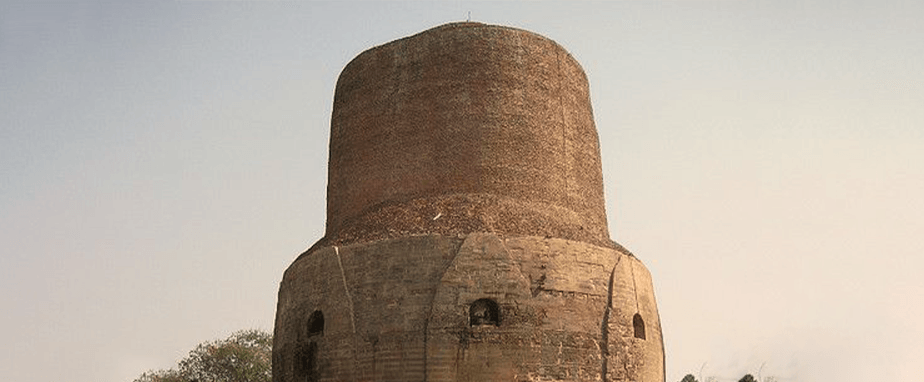
What to See in Sarnath: Top Attractions
Dhamek Stupa
The Dhamek Stupa is Sarnath's most iconic monument—a massive cylindrical brick structure standing 43.6 meters high and 28 meters in diameter. Built during the Gupta period (5th century CE), it marks the exact spot where Buddha gave his first sermon.
The stupa's base features intricately carved stone blocks with geometric and floral patterns, while the upper portion showcases plain, weathered brick that has stood for over 1,500 years. The structure is surrounded by well-maintained lawns and excavated ruins of ancient monasteries.
Ashokan Pillar
Emperor Ashoka erected a polished sandstone pillar here around 250 BCE. The original Lion Capital—India's national emblem—was removed from this pillar and is now housed in the Sarnath Museum. The pillar shaft remains in situ near the Dhamek Stupa, still bearing Ashoka's edict prohibiting schism in the Buddhist community.
Sarnath Archaeological Museum: Entry Fee & Timings
Sarnath Archaeological Museum (established 1910) is one of India's oldest site museums, housing 6,832 artifacts ranging from the 3rd century BCE to the 12th century CE.
Must-See Exhibits:
-
Lion Capital of Ashoka: The museum's crown jewel—four Asiatic lions standing back-to-back on a circular abacus decorated with a horse, bull, elephant, and lion separated by Dharmachakras (wheels of law). This sculpture became India's national emblem.
-
Buddha Images: A stunning collection including:
- 5th-century standing Buddha sculpture showing sublime craftsmanship
- Various Buddha and Bodhisattva images from different periods
- Life-size standing Bodhisattva with lotus
-
The Dharmachakra (Dharma Wheel): An intricately carved wheel from the base of the Ashokan pillar, now featured on India's national flag.
-
Artifacts from Mauryan, Kushana, and Gupta Periods: Sculptures of Hindu deities (9th-12th century), architectural remains, and inscriptions.
Museum Layout: Five galleries and two verandahs display the collection in chronological order, following the pattern of a traditional Buddhist monastery (Sangharam).
Sarnath Museum Timings and Entry Fee (2025)
Sarnath Museum Timings:
- Opening: 9:00 AM
- Closing: 5:00 PM
- Closed: Every Friday
Entry Fees (2025):
- Museum Only: ₹5 for Indians; ₹100 for foreigners
- Children: Free for under 15 years
- Combo Ticket (Museum + Archaeological Site with Dhamek Stupa): ₹20 for Indians/SAARC/BIMSTEC citizens; ₹250 for other foreigners
Note: The archaeological excavation site (outdoors) remains open even on Fridays, operating from sunrise to sunset.
Photography: Generally not permitted inside the museum galleries, but allowed in outdoor archaeological areas.
Other Sarnath Tourist Attractions
Chaukhandi Stupa: An early structure marking where Buddha first met his five disciples.
Mulagandha Kuti Vihar: A modern temple built in 1931 with beautiful murals depicting Buddha's life, painted by Japanese artist Kosetsu Nosu.
Thai, Tibetan, and Sri Lankan Temples: International Buddhist communities have established beautiful temples here, each reflecting their architectural traditions.
Varanasi to Sarnath Distance & Transport Options
Distance: 10-13 km from Varanasi city center (9 km from Varanasi Junction railway station)
Travel Time: 30-45 minutes depending on traffic
Transportation Options:
Taxi/Cab:
- One-way: ₹300-600
- Round-trip with waiting (3-4 hours): ₹600-1,200
- Book through hotel, online platforms, or negotiate at taxi stands
Auto-rickshaw: ₹200-400 round trip (negotiate in advance)
App-based Rides: Uber/Ola available
Local Bus: Budget option but less convenient for tourists with time constraints
Recommended Visit Duration: Allocate 2-3 hours for Sarnath (museum visit + walking around the archaeological site).
Complete Sarnath transport guide: Varanasi to Sarnath Tempo Traveller for group travel with guided tours, or Buddhist Circuit Tour Tempo Traveller for extended Buddhist pilgrimage routes including Bodh Gaya and Kushinagar.
Key Temples & Monuments in Varanasi

Kashi Vishwanath Temple: Entry Fee & Darshan Timings

Kashi Vishwanath Temple is Varanasi's spiritual epicenter and one of the twelve sacred Jyotirlingas (manifestations of Lord Shiva). The temple houses a black stone Shiva Lingam in its sanctum, while its iconic gold-plated spire dominates the city skyline.

Temple Timings (2025):
- Opening: 2:30-3:00 AM (for priests)
- General Darshan: 4:00 AM - 11:00 PM
- Extended Hours: During Shravan month (July-August) and special festivals, the temple opens 6:00 AM - 11:00 PM
What Is the Entry Fee for Kashi Vishwanath Temple?
General Entry: Free (no basic darshan ticket required)
Special Darshan & Aarti Tickets (to avoid long queues and participate in special ceremonies):
- Sugam Darshan (Fast-track): ₹300 per person (6:00 AM - 6:00 PM)
- Mangla Aarti (Early morning): ₹350 on normal days; ₹600 during Shravan (excluding Mondays); ₹1,200 on Shravan Mondays; ₹1,800 on Maha Shivratri (3:00-4:00 AM)
- Bhog Aarti: ₹180 per person (11:15 AM - 12:20 PM)
- Saptarishi/Sandhya Aarti: ₹180 (7:00-8:15 PM)
- Shringar/Night Bhog Aarti: ₹180 (9:00-10:15 PM)
- Shayan Aarti: Free (10:30-11:00 PM)
Entry Rules:
- No leather items (shoes, belts, bags) allowed inside the temple premises
- Dress modestly with covered shoulders and legs
- Mobile phones and cameras generally not permitted in inner sanctum
- Children under 12 years: Free entry
- Valid ID proof required for special darshan bookings
Booking: Special darshan and aarti tickets can be booked online through the official Kashi Vishwanath Temple website or at the temple helpdesk near Shapuri Mall.
Best Time to Visit: Early morning (4:00-6:00 AM) or late evening (after 8:00 PM) to avoid peak crowds. Fridays and Mondays see significantly more visitors.
Combine temple darshan with Ganga Aarti: Kashi Vishwanath Temple & Ganga Aarti Spiritual Journey 2025 offers a complete pilgrimage itinerary linking temple visit with evening aarti.
Temple Location: In the heart of old Varanasi, accessible through narrow lanes (galis). The Vishwanath Gali (Temple Lane) leading to the temple is pedestrian-only.
Sankat Mochan Hanuman Temple Varanasi
Dedicated to Lord Hanuman, Sankat Mochan (the "reliever of troubles") is one of Varanasi's most beloved temples. Founded by the poet-saint Tulsidas in the early 16th century, it's believed that worshipping here removes obstacles and grants wishes.
Timings: Generally 4:00 AM - 10:00 PM (can vary)
Entry Fee: Free
Special Note: Tuesdays and Saturdays see extra rush, as these days are considered especially auspicious for Hanuman worship
Accessibility: This temple has integrated barrier-free infrastructure including ramps and wheelchair provisions, setting a good example for accessibility in heritage structures.
Bharat Mata Temple: Unique India Map Temple
Unlike any other temple in India, Bharat Mata Temple is dedicated to Mother India rather than a deity. Inaugurated by Mahatma Gandhi in 1936, the temple features a spectacular relief map of undivided India carved in white marble, depicting mountains, plains, and oceans to scale.
Timings: 9:30 AM - 8:00 PM daily
Entry Fee: Free (no entry charge)
Location: Mahatma Gandhi Kashi Vidyapeeth campus, approximately 3 km from Varanasi Junction
What to Expect: The pentagonal structure features five pillars supporting the marble map. It's a symbol of patriotism rather than religious worship, making it unique among Varanasi attractions.
Best Time to Visit: Republic Day (January 26) and Independence Day (August 15) when patriotic programs are held.
Dress Code: No strict dress code, but modest attire recommended. Footwear must be removed.
Ramnagar Fort: Museum Timings & Entry Fee
Ramnagar Fort, built in 1750 by Kashi Naresh Raja Balwant Singh, stands on the eastern bank of the Ganges opposite Tulsi Ghat. Constructed from creamy-colored Chunar sandstone in Mughal architectural style, it remains the residence of the current Maharaja.
Timings:
- Winter: 10:00 AM - 4:30 PM
- Summer: 10:00 AM - 5:00 PM
Entry Fees:
- Museum Visit: ₹20-75 for Indian adults; ₹150-200 for foreigners
- Children (5-12 years): ₹10-20 for Indians; ₹100 for foreigners
- Fort Grounds: Sometimes listed as free, with charges only for museum access
What to See:
- Museum: Vintage cars, royal costumes, antique weaponry, palanquins, and artifacts from the Banaras royal family
- Durbar Hall: Features vivid frescoes and a marble balcony where royal assemblies were once held
- Saraswati Bhawan: Library with rare manuscripts and texts
- Riverside Views: Panoramic views of the Ganges and western ghats
Getting There: 12-15 km from central Varanasi (30-40 minutes by taxi). During monsoon season, the fort may only be accessible via ferry service when water levels rise.
Best Time to Visit: 11:00 AM - 4:00 PM. The fort looks stunning during the Dussehra festival when the famous Ramnagar Ramlila (month-long theatrical performance of the Ramayana) takes place.
Festival guides: Ultimate Guide Ramlila Dussehra Varanasi 2025, Ramnagar Ramlila Moving Stages Guide, Ram Rajya Finale Ramnagar Ramlila, Dussehra Ravana Dahan Varanasi, and Bharat Milap Nati Imli for festival-specific transport.
Specialized Itineraries: Traveling with a group? Check our Varanasi with Friends Guide. Bringing elderly parents? See our Family Tour Itinerary.
Practical Travel Information for Varanasi

Local Transportation in Varanasi
Within Varanasi City:
Auto-rickshaws: Most common for short-to-medium distances. Always negotiate fare before boarding. Typical rates: ₹30-100 for trips within the city.
Cycle-rickshaws: For navigating narrow lanes near the ghats. Slower but charming. ₹20-50 for short trips.
App-based Rides: Uber and Ola operate in Varanasi. Generally more reliable pricing than negotiating with local auto drivers.
Taxis: Full-day hiring:
- Sedan (Dzire/Etios): ₹1,800-3,000
- SUV (Innova): ₹2,400-3,500
- Innova Crysta: ₹2,600-4,000
- Tempo Traveller (for groups): ₹6,500 full day
Walking: The ghat area and old city are best explored on foot. Many lanes are too narrow for vehicles.
Important Notes:
- Kashi Vishwanath Temple Corridor is a no-vehicle zone. Vehicles stop 1.5 km away; walk or take e-rickshaws from there.
- During major festivals and VIP visits, expect traffic diversions and road closures.
Complete transport pricing: Varanasi Transport Price Guide 2025 and Outstation Cabs from Varanasi for travel beyond the city. For route-specific guides: Lucknow to Varanasi Taxi Fare.
Where to Stay in Varanasi: Best Areas for Hotels

Near the Ghats (for spiritual immersion):
- Advantages: Walking distance to Ganga Aarti, sunrise boat rides, and temples
- Challenges: Narrow lanes inaccessible to cars; may require walking with luggage. Can be noisy. Limited wheelchair accessibility.
- Price Range: ₹1,500-6,000 per night for guesthouse to boutique hotel
Opposite Side of City (better infrastructure):
- Advantages: Better accessibility, quieter, wider roads for vehicles
- Challenges: 20-30 minute commute to ghats
- Price Range: ₹2,000-8,000 per night for mid-range to luxury
Recommended Areas:
- Assi Ghat area: Popular with backpackers, cafes nearby, more laid-back
- Dashashwamedh area: Central, closest to main action, can be very crowded
- Cantonment/Railway Station area: Better hotels, away from chaos
Budget Options: ₹800-1,500 per night
Mid-Range: ₹2,000-5,000
Luxury: ₹6,000-15,000+
Tourist Guide Cost in Varanasi (Official Rates 2025)
Hiring a licensed government-approved guide significantly enhances understanding of Varanasi's complex history and rituals.
Official Guide Rates (2025):
Half-Day (3-4 hours):
- 1-5 persons: ₹1,600
- 6-14 persons: ₹2,000
- 15-35 persons: ₹2,650
Full-Day (6-8 hours):
- 1-5 persons: ₹2,000
- 6-14 persons: ₹2,600
- 15-35 persons: ₹3,450
Per Sightseeing Activity Basis (Ganga Aarti/Morning Boat Ride/Temple Tour/Sarnath): Charged as half-day rate
Additional Charges:
- Foreign Language (beyond English/Hindi): ₹350-550 extra per half/full day
- Morning/Evening Allowance: ₹100
- Outside Varanasi Travel: ₹2,000-3,000 per day
Specialized Tours (Heritage, Ritual, Food tours): ₹2,500+ depending on complexity
Where to Book Legitimate Guides:
- Official tourism counter at the airport or railway station
- Government-certified guide associations
- Reputable platforms: TripCosmos.co, Varanasiguru.com
- Hotel concierge referrals
Warning: Avoid unlicensed "lapka" guides who approach you on the streets. They often lead tourists to shops where they receive commissions, inflate prices, and may not provide accurate information.
Food Safety & Must-Try Street Food in Varanasi

What Are the Must-Try Foods in Varanasi?
Varanasi's culinary scene is predominantly vegetarian and legendary.
Must-Try Street Foods:
-
Kachori Sabzi: Deep-fried pastry served with spicy chickpea curry. Best at Ram Bhandar (beside Lakshmi Chaiwala) or Balaji Kachori
-
Tamatar Chaat: Tangy tomato-based chaat (savory snack). Try at Kashi Chat Bhandar or Dinanath Chaat
-
Banarasi Lassi: Thick, creamy yogurt drink. Famous at Blue Lassi Shop
-
Malaiyyo: A winter-only specialty (November-February) - ethereal, milk-foam dessert. Get it at Shreeji
-
Aloo Tikki Chaat: Spiced potato patties with yogurt and chutneys
-
Jalebi: Crispy, syrup-soaked spirals. Best fresh and hot
-
Banarasi Paan: Traditional betel leaf preparation. An after-meal ritual
-
Thandai: A cooling milk-based drink with nuts and spices
Popular Eating Spots:
- Godowlia Market: Hub for street food
- Kachori Gali: Near Dashashwamedh Ghat
- Vishwanath Gali: Temple lane with food stalls
Food Safety Tips:
- Eat at busy stalls with high turnover (food is fresher)
- Opt for hot, freshly cooked items
- Avoid raw vegetables and pre-cut fruits from street vendors
- Drink only bottled or filtered water
- UP Tourism Department has trained 500+ street food vendors in hygiene standards
- If sensitive stomach, stick to restaurants first few days before trying street food
Varanasi Festivals: Best Times to Experience the City
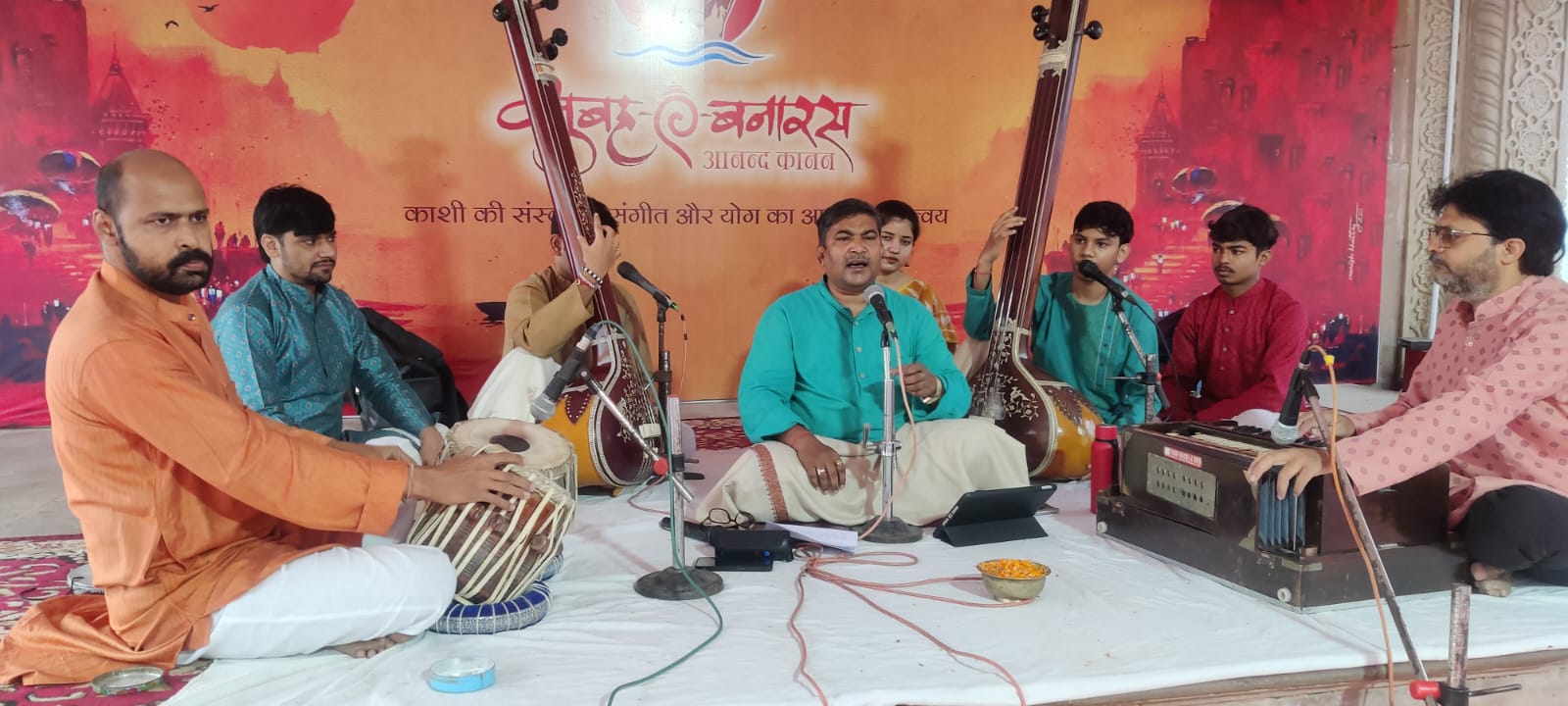
Dev Deepawali (November 12, 2025 / Kartik Purnima):

The "Diwali of the Gods" is Varanasi's most spectacular festival. Over a million earthen lamps illuminate all 84 ghats, creating a surreal golden glow across the Ganges. According to Hindu belief, celestial beings descend to bathe in the river on this night.
- Celebrations: 5-day festival starting on Prabodhini Ekadashi
- Main Event: Evening aarti begins around 5:30 PM; lamp-lighting ceremony after sunset
- Crowd Level: Extremely high - book accommodations and transport 2-3 months in advance
- Special Access: VIP boat packages cost ₹3,000-6,000
Complete festival guide: Dev Deepawali 2025 Varanasi Ultimate Guide
Ganga Mahotsav (November 5-12, 2025):
A 5-day cultural festival running parallel to Dev Deepawali, held at Sant Ravidas Ghat. Features classical music, dance performances, boat racing, and craft exhibitions.
Cultural guides: Ganga Mahotsav 2025, Varanasi Classical Music Heritage, and Varanasi Instrument Market Guide for musical heritage exploration.
Maha Shivratri (February/March):
Varanasi's most important festival as the abode of Lord Shiva. Devotees from across India throng to Kashi Vishwanath Temple. The city experiences massive crowds. Special Mangla Aarti tickets cost ₹1,800.
Shivaratri resources: Maha Shivaratri 2026 Varanasi Guide, Kashi Vishwanath Shivaratri Crowd Survival Guide, Shiv Baraat Viewing Guide, and Shivaratri Cultural Deep Dive.
Other Major Festivals:
Ganga Dussehra (May/June):
Celebrates the descent of Ganga to Earth. Devotees take holy dips believing it washes away sins.
Nag Nathaiya/Nag Panchami (July/August):
Snake worship festival during Shravan month. Temple activities intensify during this period.
Best Weather Months: October-March offers the most comfortable conditions for festivals and general sightseeing.
Tourist Scams to Avoid in Varanasi
Be aware of common Varanasi scams to protect yourself.
Fake Priest Scam: Individuals dressed as priests at ghats offer unsolicited blessings or tilak (forehead mark), then demand ₹500-2,000. Solution: Politely decline unsolicited services. If you want a blessing, negotiate price upfront (₹10-20 is reasonable).
Inflated Boat Prices: Boatmen quote ₹2,000-3,000 for rides that should cost ₹200-300. Solution: Always negotiate and settle price before boarding. Know standard rates: ₹200-300 per person shared; ₹800-1,500 private.
Lapka (Fake Guide) Scam: Unauthorized guides offer tours, then take you shopping where they earn commissions. Prices are inflated 3-5x. Solution: Only hire licensed government guides (carry ID badges). Book through official channels or reputable platforms.
Hotel Booking Fraud: Scammers call claiming to be from your booked hotel, asking for direct bank payment to "confirm" your reservation. Upon arrival, the hotel doesn't exist or never received payment. Solution: Only book through secure, reputable platforms. Never make direct bank transfers to unverified accounts.
Cremation Ground Donations: At Manikarnika Ghat, individuals pressure tourists for large donations (₹1,000-5,000) for cremation wood. While some are genuine, many are opportunistic. Solution: Donations are voluntary. If contributing, ₹100-500 is reasonable. Never feel obligated.
General Safety Tips:
- Keep valuables secure; beware of pickpockets in crowded areas
- Negotiate prices for all services upfront
- Be cautious of strangers offering "special" tours or deals
- Trust your instincts; if something feels wrong, walk away
Emergency Contacts & Important Numbers
Keep these numbers handy during your Varanasi visit:
Emergency Services:
- Unified Emergency Number: 112 (Police, Fire, Medical - 24/7)
- Ambulance: 102
- Women's Helpline: 1091
- Child Helpline: 1098
- Tourist Police: 112 (mention you're a tourist for English assistance)
Medical Facilities:
- Sir Sunderlal Hospital, BHU: 0542-2368547 (Major hospital with emergency dept)
- Shiva Prasad Gupt Hospital: 0542-2214723
- IMA Blood Bank & Ambulance: 0542-3209111
- Medical Emergency Helpline: 0542-2508077
Administrative:
- District Magistrate Office: 0542-2508585 (for administrative issues, permits)
- Chief Medical Officer: 0542-2310168
Transportation:
- Varanasi Airport (Lal Bahadur Shastri International): 0542-2622081
- Railway Enquiry: 131 or 139 (automated); 0542-2504131 (Varanasi Junction)
- Railway Reservation: 0542-2504031
Consular Assistance:
Foreign nationals should note their embassy/consulate contacts in Delhi or Kolkata (nearest major cities with diplomatic missions).
Important: When dialing from international roaming, prefix numbers with +91-542 (Varanasi city code).
Frequently Asked Questions
What are the Ganga Aarti timings in Varanasi?
Evening Ganga Aarti at Dashashwamedh Ghat: Summer (April-September) at 7:00 PM, Winter (October-March) at 6:00 PM. Morning Aarti at Assi Ghat starts around 5:00-5:30 AM. Duration is approximately 45 minutes.
How much does a boat ride cost in Varanasi?
Shared boats cost ₹150-300 per person for sunrise or evening rides. Private boats range from ₹800-2,000 depending on duration and boat type. Typical ride duration is 1-2 hours.
What are Sarnath museum timings and entry fees?
Sarnath Museum opens 9:00 AM to 5:00 PM, closed on Fridays. Entry fee: ₹5 for Indians, ₹100 for foreigners. Combo ticket with archaeological site: ₹20 for Indians, ₹250 for foreigners.
Is photography allowed at Manikarnika Ghat?
No, photography and videography are strictly prohibited at cremation ceremonies at Manikarnika Ghat. This is considered deeply disrespectful to grieving families. You may photograph the ghat area away from active cremations.
What is the best time to visit Varanasi?
October to March is the best time, with pleasant weather (5-25°C). Avoid April-June (extreme heat, 30-45°C) and July-August (heavy monsoon). Winter also coincides with major festivals like Dev Deepawali.
How far is Varanasi airport from the city?
Lal Bahadur Shastri International Airport is approximately 25 km from Varanasi city center. Travel time is 40-60 minutes depending on traffic. Airport taxi costs ₹900-2,500.
What should I wear when visiting temples in Varanasi?
Dress modestly with covered shoulders and legs. Avoid revealing clothing. Remove leather items before entering temples. Footwear must be removed at temple entrances.
How much does a local guide cost in Varanasi?
Half-day (3-4 hours): ₹1,600-2,000. Full-day (6-8 hours): ₹2,000-3,000. Prices vary based on group size and language requirements. Always hire licensed government-approved guides.
What is the distance from Varanasi to Sarnath?
Sarnath is approximately 10-13 km from Varanasi city center. Travel time is 30-45 minutes by taxi. Taxi cost: ₹600-1,200 for round trip.
What are the main scams to avoid in Varanasi?
Common scams include fake priests demanding high donations, inflated boat prices, unauthorized 'lapka' guides, and hotel booking fraud. Always negotiate prices upfront, book through reputable sources, and politely decline unsolicited services.
How many days should I spend in Varanasi?
Minimum 2 days recommended. Day 1: Sunrise boat ride, ghats walk, Kashi Vishwanath Temple, evening Ganga Aarti. Day 2: Sarnath visit, BHU temple, remaining temples. Ideal stay: 3-4 days for complete exploration.
What are the must-try foods in Varanasi?
Must-try: Kachori Sabzi, Tamatar Chaat, Banarasi Lassi, Malaiyyo (winter specialty), Jalebi, Banarasi Paan. Eat at popular spots like Ram Bhandar (kachori), Kashi Chat Bhandar, and Blue Lassi.
Summary: Planning Your Varanasi Sightseeing Journey
Varanasi sightseeing is a journey into India's spiritual heart, where ancient traditions meet contemporary travelers seeking authentic experiences. From the mesmerizing Ganga Aarti ceremonies and sunrise boat rides to the Buddhist heritage of Sarnath and the architectural marvels of temples, this complete guide equips you with everything needed for a memorable visit.
Key Takeaways:
- Best time: October-March for ideal weather
- Minimum duration: 2-3 days to cover major highlights
- Must-experiences: Sunrise boat ride, evening Ganga Aarti, Sarnath visit, Kashi Vishwanath darshan
- Budget: ₹5,000-9,000 per day for mid-range experience
- Advance booking essential: Dev Deepawali (Nov 12, 2025) requires 4-6 weeks advance planning
Ready to Book Your Tour? Check our Varanasi Local Sightseeing Package with half-day and full-day options from ₹1,800. Start with our Varanasi Airport Taxi Guide and plan your arrival logistics. For complete tour packages, see Tour Packages from Varanasi and Varanasi Tour Package.
Multi-City Pilgrimage Tours:
South India Bus Packages:
Tempo Traveller Resources:
Need assistance planning your Varanasi sightseeing tour?
WhatsApp +91 94503 01573 for customized itineraries, verified guides, and reliable transport arrangements.
























![Tempo Traveller Varanasi: Rates & Booking [2025]](https://res.cloudinary.com/dkntlqbwr/image/upload/kashitaxi/kashitaxi/Tempo-Travellar_landscape_Village.jpeg)